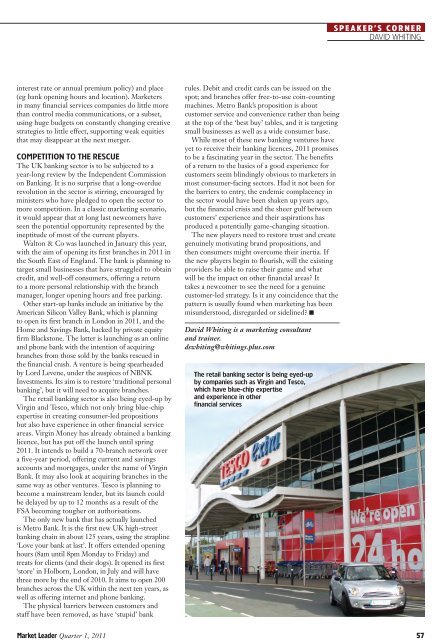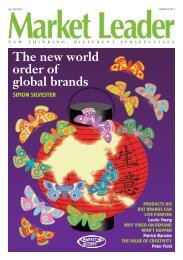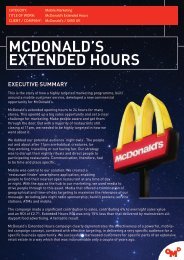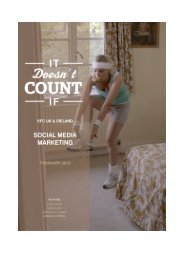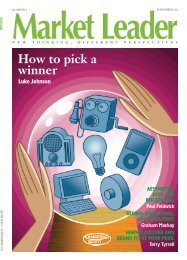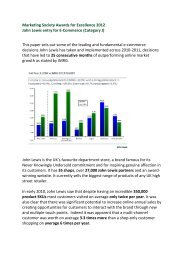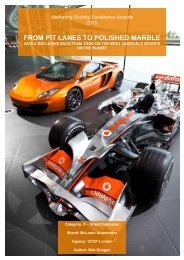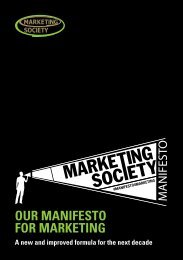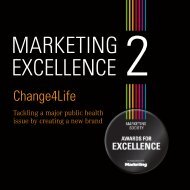MARKET LEADER q1 11 COVER draft 1.indd - The Marketing Society
MARKET LEADER q1 11 COVER draft 1.indd - The Marketing Society
MARKET LEADER q1 11 COVER draft 1.indd - The Marketing Society
Create successful ePaper yourself
Turn your PDF publications into a flip-book with our unique Google optimized e-Paper software.
s p e a k e r ’ s co r n e r<br />
david whiting<br />
interest rate or annual premium policy) and place<br />
(eg bank opening hours and location). Marketers<br />
in many financial services companies do little more<br />
than control media communications, or a subset,<br />
using huge budgets on constantly changing creative<br />
strategies to little effect, supporting weak equities<br />
that may disappear at the next merger.<br />
Competition to the rescue<br />
<strong>The</strong> UK banking sector is to be subjected to a<br />
year-long review by the Independent Commission<br />
on Banking. It is no surprise that a long-overdue<br />
revolution in the sector is stirring, encouraged by<br />
ministers who have pledged to open the sector to<br />
more competition. In a classic marketing scenario,<br />
it would appear that at long last newcomers have<br />
seen the potential opportunity represented by the<br />
ineptitude of most of the current players.<br />
Walton & Co was launched in January this year,<br />
with the aim of opening its first branches in 20<strong>11</strong> in<br />
the South East of England. <strong>The</strong> bank is planning to<br />
target small businesses that have struggled to obtain<br />
credit, and well-off consumers, offering a return<br />
to a more personal relationship with the branch<br />
manager, longer opening hours and free parking.<br />
Other start-up banks include an initiative by the<br />
American Silicon Valley Bank, which is planning<br />
to open its first branch in London in 20<strong>11</strong>, and the<br />
Home and Savings Bank, backed by private equity<br />
firm Blackstone. <strong>The</strong> latter is launching as an online<br />
and phone bank with the intention of acquiring<br />
branches from those sold by the banks rescued in<br />
the financial crash. A venture is being spearheaded<br />
by Lord Levene, under the auspices of NBNK<br />
Investments. Its aim is to restore ‘traditional personal<br />
banking’, but it will need to acquire branches.<br />
<strong>The</strong> retail banking sector is also being eyed-up by<br />
Virgin and Tesco, which not only bring blue-chip<br />
expertise in creating consumer-led propositions<br />
but also have experience in other financial service<br />
areas. Virgin Money has already obtained a banking<br />
licence, but has put off the launch until spring<br />
20<strong>11</strong>. It intends to build a 70-branch network over<br />
a five-year period, offering current and savings<br />
accounts and mortgages, under the name of Virgin<br />
Bank. It may also look at acquiring branches in the<br />
same way as other ventures. Tesco is planning to<br />
become a mainstream lender, but its launch could<br />
be delayed by up to 12 months as a result of the<br />
FSA becoming tougher on authorisations.<br />
<strong>The</strong> only new bank that has actually launched<br />
is Metro Bank. It is the first new UK high-street<br />
banking chain in about 125 years, using the strapline<br />
‘Love your bank at last’. It offers extended opening<br />
hours (8am until 8pm Monday to Friday) and<br />
treats for clients (and their dogs). It opened its first<br />
‘store’ in Holborn, London, in July and will have<br />
three more by the end of 2010. It aims to open 200<br />
branches across the UK within the next ten years, as<br />
well as offering internet and phone banking.<br />
<strong>The</strong> physical barriers between customers and<br />
staff have been removed, as have ‘stupid’ bank<br />
rules. Debit and credit cards can be issued on the<br />
spot; and branches offer free-to-use coin-counting<br />
machines. Metro Bank’s proposition is about<br />
customer service and convenience rather than being<br />
at the top of the ‘best buy’ tables, and it is targeting<br />
small businesses as well as a wide consumer base.<br />
While most of these new banking ventures have<br />
yet to receive their banking licences, 20<strong>11</strong> promises<br />
to be a fascinating year in the sector. <strong>The</strong> benefits<br />
of a return to the basics of a good experience for<br />
customers seem blindingly obvious to marketers in<br />
most consumer-facing sectors. Had it not been for<br />
the barriers to entry, the endemic complacency in<br />
the sector would have been shaken up years ago,<br />
but the financial crisis and the sheer gulf between<br />
customers’ experience and their aspirations has<br />
produced a potentially game-changing situation.<br />
<strong>The</strong> new players need to restore trust and create<br />
genuinely motivating brand propositions, and<br />
then consumers might overcome their inertia. If<br />
the new players begin to flourish, will the existing<br />
providers be able to raise their game and what<br />
will be the impact on other financial areas? It<br />
takes a newcomer to see the need for a genuine<br />
customer-led strategy. Is it any coincidence that the<br />
pattern is usually found when marketing has been<br />
misunderstood, disregarded or sidelined? n<br />
David Whiting is a marketing consultant<br />
and trainer.<br />
dswhiting@whitings.plus.com<br />
<strong>The</strong> retail banking sector is being eyed-up<br />
by companies such as Virgin and Tesco,<br />
which have blue-chip expertise<br />
and experience in other<br />
financial services<br />
Market Leader Quarter 1, 20<strong>11</strong> 57


